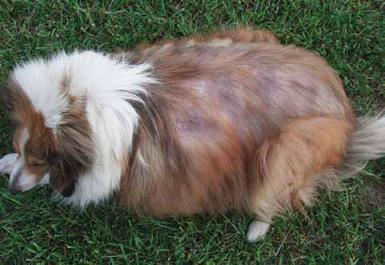Hypothyroidism is a condition that mainly affects dogs (and
people). It means there is not enough circulating thyroid for the body to use.
Thyroid hormones play an important roll in the function of many body systems. Due
to the wide impact of thyroid hormone, there are a range of symptoms that may
be seen. Typically this condition is diagnosed in middle aged dogs, however
younger and older dogs can be affected.
While there are a variety of symptoms that can occur, there
are several that are most commonly noted. These include lethargy (or lack of
energy), weight gain, trouble with their coat and heat seeking behavior. These
are actually similar to the symptoms noted in humans as well. To focus a little
more on the coat, the symptoms can range from hair loss, to a dull coat or the
hair not re-growing after trimming. It can also include recurrent skin
infections. Some of the less frequently seen symptoms include weakness, facial
paralysis, and even seizures. Additional problems to note in dogs can include
ocular problems such as glaucoma. This can occur secondary to the extra
triglycerides that circulate in dogs with hypothyroidism. They can cause a
blockage of the draining of the eye which can lead to an increase in pressure.
These triglycerides can also build up and cause some precipitation in the eye
which can look like crystals. It is possible for pets to only have one or even
all of these symptoms at once.
If your pet struggles with any of these your veterinary may
recommend testing for thyroid disease. Diagnosing a dog with hypothyroidism
involves more than just screening the circulating thyroid levels. It includes a
blood test panel that screens for levels of many different thyroid hormones.
Typically several abnormalities in this panel need to be present before a
diagnosis can be made. This is due to the fact that circulating thyroid alone
can be low in pets that are just not feeling well but do not have a problem
with thyroid disease. When there are several abnormalities however this is when
we can accurately make a diagnosis and start treatment.
Hypothyroidism is managed, not cured. It will be a
medication that will be given lifelong and typically require regular blood
tests to assure adequate response. While the medication is similar to what
humans would take the dosing is much different. It is very important if a
person and a dog in the household are on medication for hypothyroidism that the
prescriptions are not confused. Humans is MUCH SMALLER doses in this instance
than dogs do. While the medication is well tolerated it is best not to get them
mixed up to avoid any toxicity issues in humans or pets. If you have any
questions about this condition please contact your veterinarian. More
information can also be found at veterinary partner
here.



No comments:
Post a Comment